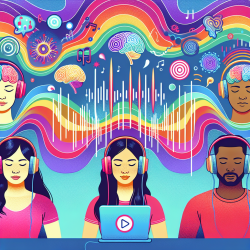Introduction
As a Special Education Director, staying informed about the latest research is crucial for guiding our practices and policies. A recent study titled "Associations between sport and screen-entertainment with mental health problems in 5-year-old children" offers valuable insights into the impact of physical activity and screen time on young children's mental health. This blog will explore how practitioners can leverage these findings to enhance their skills and encourage further research.
The Study at a Glance
The research conducted by Griffiths et al. (2010) involved a cross-sectional analysis of data from 13,470 children participating in the UK Millennium Cohort Study. The study examined the associations between participation in sports, screen-entertainment, and various emotional and behavioral problems in 5-year-old children. The findings revealed that children who participated in sports had fewer emotional, conduct, hyperactivity-inattention, and peer relationship problems, along with more prosocial behaviors.
Key Findings
- 45% of children did not participate in sports clubs, while 61% used screen-entertainment for more than 2 hours per day.
- Participation in sports was associated with fewer mental health problems and more prosocial behaviors, regardless of screen time duration.
- Screen-entertainment was not significantly associated with mental health problems in boys but was linked to emotional and conduct problems in girls.
Implications for Practitioners
These findings underscore the importance of promoting physical activity among young children. As practitioners, we can implement strategies to encourage sports participation both in and out of school. Here are some actionable steps:
- Collaborate with local sports clubs to create accessible programs for young children.
- Incorporate more physical activities into the school curriculum to ensure every child gets ample exercise.
- Educate parents about the benefits of limiting screen time and encourage outdoor play.
Encouraging Further Research
While this study provides valuable insights, it also highlights the need for further research, particularly longitudinal studies, to explore the causal pathways between physical activity and mental health. Practitioners can contribute to this research by:
- Participating in or initiating longitudinal studies within their districts.
- Collecting and sharing data on children's physical activity and mental health outcomes.
- Collaborating with researchers to explore innovative interventions and their impacts.
Conclusion
The study by Griffiths et al. (2010) highlights the positive impact of sports participation on young children's mental health, irrespective of screen time. As practitioners, we have a pivotal role in promoting physical activity and supporting research efforts to further understand these associations. By doing so, we can enhance the well-being of the children we serve.
To read the original research paper, please follow this link: Associations between sport and screen-entertainment with mental health problems in 5-year-old children.










